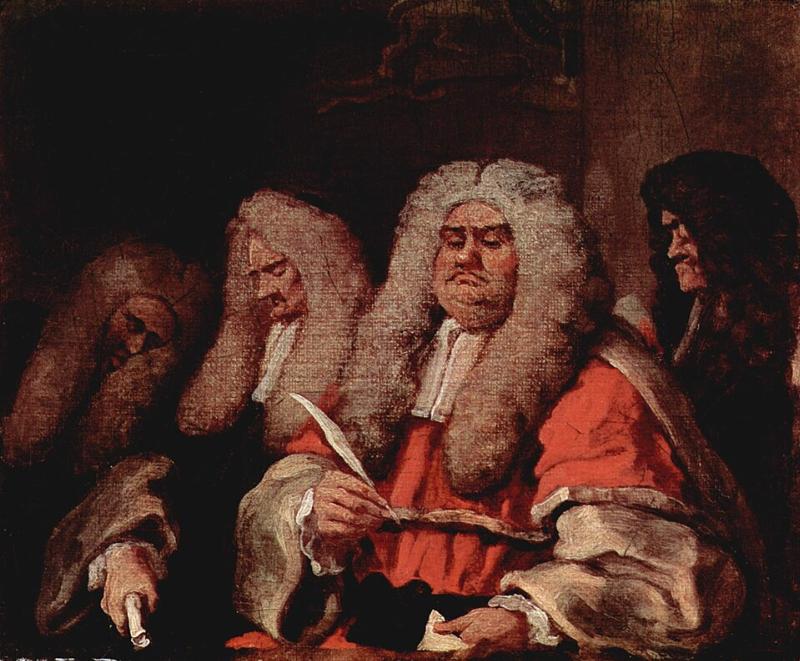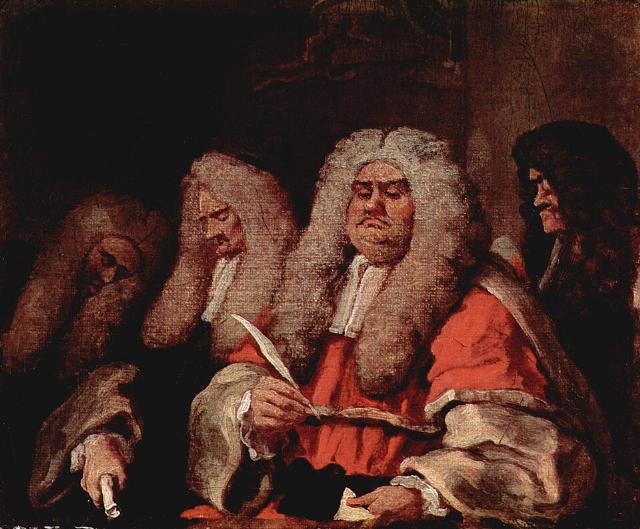



From Wikimedia Commons: The Bench (William Hogarth, circa 1758)
The United Kingdom is facing a confluence of challenges that strike at the very heart of its democratic legitimacy, national sovereignty, and social cohesion. At issue are, not only institutional convolutions but also growing public disillusionment with how justice is administered, how power is exercised, and how British identity is being reshaped — without the explicit consent of the people.
Pressing concerns are the erosion of “parliamentary sovereignty”, the rise of unaccountable judicial and bureaucratic influence, the consequences of unchecked immigration, the double standards in law enforcement, and the cultural tensions born from demographic and ideological shifts. As much as these developments threaten abstract principles, they offend the ordinary citizen’s basic sense of justice, fairness, and national belonging.
At the core of British democracy lies the principle of parliamentary sovereignty — the belief that the elected representatives of the people should hold ultimate authority over national policy. Yet in practice, this principle has been eroded. Increasingly, decision-making is outsourced to civil servants, regulatory bodies, expert panels, and judicial institutions that operate with limited democratic oversight. This “rule by experts” may be justified by the complexity of modern governance, but it severs the link between the electorate and those who wield power.
The result is a creeping “technocracy” in which policy is shaped behind closed doors by unelected elites. Public health mandates, immigration decisions, and regulatory changes are imposed without meaningful debate in Parliament or consideration of public opinion. Citizens rightly question: if decisions that shape our lives are made without our input, who, exactly, governs us?
The power of judges — both domestic and foreign — to overrule elected governments has become a flashpoint in this democratic disconnect. British courts, and particularly supranational bodies like the European Court of Human Rights (ECHR), increasingly intervene in areas that should be the preserve of Parliament — especially immigration, deportation, and national security.
It is difficult for many to accept that foreign judges in Strasbourg can block the deportation of convicted criminals or illegal migrants from the UK, invoking vague interpretations of “human rights”. These rulings override the expressed will of Parliament and offend the basic public expectation that dangerous or unlawful individuals should be removed from the country. Such decisions feel unjust and undemocratic — a violation of national self-determination and the public’s instinctive sense of fairness.
This judicial overreach also undermines the government’s ability to enforce immigration controls and border security, further feeding the belief that Britain has lost control of who resides within its borders — and who decides.
Among the most corrosive developments in recent years is the emergence of a “two-tier policing” system — one where the law is not applied equally, but selectively, based on political ideology, social status, or identity group.
At the grassroots level, ordinary citizens increasingly feel that the police no longer serve or protect them. Across the country, crimes such as burglary, knife violence, drug trafficking, and anti-social behavior go uninvestigated. Victims are routinely told that there are no officers available, or that the crime is “low priority”. In countless cases, CCTV evidence is ignored, suspects are not interviewed, and communities are left to fend for themselves. The message to ordinary law-abiding people is clear: you are on your own.
At the same time, however, police resources appear to be readily available for other kinds of enforcement — especially when it comes to political speech, online comments, or protests that do not conform to mainstream progressive causes. Officers attend complaints about social media posts, misgendering incidents, or vaguely defined “hate incidents”, even when no crime has been committed. In some cases, citizens have been arrested or interrogated for simply expressing opinions that were once considered mainstream.
This disparity has fostered a widespread belief that there is now one set of rules for the politically favored, and another for everybody else. Consider the contrast in how protests are policed. Demonstrations aligned with fashionable or state-sanctioned causes often receive soft-handed treatment and even cooperation from law enforcement. Meanwhile, those associated with traditionalist, nationalist, or conservative causes are met with a heavier hand, surveillance, and legal barriers. The right to protest — a cornerstone of democratic freedom — appears increasingly conditional.
There is also concern over selective enforcement of hate crime laws. Offenses committed against certain minority groups are swiftly acted upon and highly publicized, while similar abuses against majority communities, such as white working-class Britons or Christians, receive less attention or are not recorded as hate crimes at all. This perception of institutional bias is beyond the anecdotal; it is reinforced by public statements from senior police officials who openly prioritize some categories of harm over others.
Such double standards damage the very legitimacy of law enforcement. The police are meant to be neutral enforcers of the law, not instruments of ideological enforcement. When enforcement becomes politicized, when justice becomes uneven, people lose faith in the rule of law itself. This loss of trust is not theoretical — it has real consequences. Citizens become less likely to cooperate with police, less willing to report crimes, and more inclined to seek justice outside the legal system.
In the long run, two-tier policing does not protect vulnerable groups — it endangers everybody. It breaks the covenant between the public and the state. It tells the citizenry that fairness is no longer guaranteed, and that your safety depends, not on your rights but on whether your views align with those in power.
Mass immigration continues to transform the social and cultural fabric of the UK. The scale and speed of recent demographic changes have raised serious concerns, not only about infrastructure and public services but also about democratic legitimacy.
Many feel that immigration policy has not been debated openly or decided democratically. Judicial interventions and bureaucratic discretion shape immigration outcomes rather than parliamentary debate or public consent. Moreover, when individuals with criminal records are allowed to remain in the UK due to court rulings, the question becomes not simply one of law, but of national security and moral clarity.
The British public has repeatedly expressed a desire for controlled, sustainable immigration. Yet time and again, that will is overridden — by courts, by quangos, or by successive governments that refuse to act decisively. The result is a population that feels ignored, powerless, and betrayed.
Britain rightly prides itself on being a tolerant and pluralistic society. However, the balance between granting minority privileges and respecting the interests of the majority has become dangerously skewed. When institutions and political discourse prioritize minority grievances to the point of excluding or vilifying majority concerns, social cohesion is undermined.
Ordinary people — particularly in working-class communities — feel ridiculed, labeled as “backward” or “bigoted” for expressing concerns about immigration, cultural change, or the loss of traditional values. This moral condescension fuels resentment and creates a cultural hierarchy where certain identities are protected, while others are mocked or dismissed.
This dynamic is socially divisive — and politically explosive. A democracy cannot function when large segments of the population feel demonized or silenced for holding mainstream views.
The unraveling of British civil society — especially in neglected and economically struggling areas — is perhaps the most visible sign of national decay. Rising crime, collapsing community institutions, and a sense of cultural drift all signal deeper structural failures. Without strong communities, shared values, and a functioning rule of law, democracy cannot flourish.
What many now see is not a nation growing stronger through diversity and progress, but one fragmenting under pressure — from imported ideologies, from governmental incoherence, and from elites indifferent to the everyday realities of British life. The erosion of a common culture — one born of British history, traditions, and moral clarity — leaves a vacuum that no amount of technocratic governance can fill.
The cumulative effect of judicial overreach, weak and politicized policing, unaccountable governance, and cultural disintegration is more than political instability — it is a civilizational reckoning. As it is, laws are enforced selectively, borders are porous, and many feel like strangers in their own country.
Democracy is not just about voting; it is about power residing with the people — a shared understanding of justice, national identity, and cultural continuity. When judges abroad decide who may live in the UK, when police investigate tweets but ignore theft, when violent offenders walk free while citizens are silenced, the moral foundations of the nation begin to crack.
Britain should reclaim its sovereignty and basic sense of justice — justice that is seen to be fair, proportional, and rooted in the values of its people. Without this restoration, the essence of British civilization is tragically gone.
